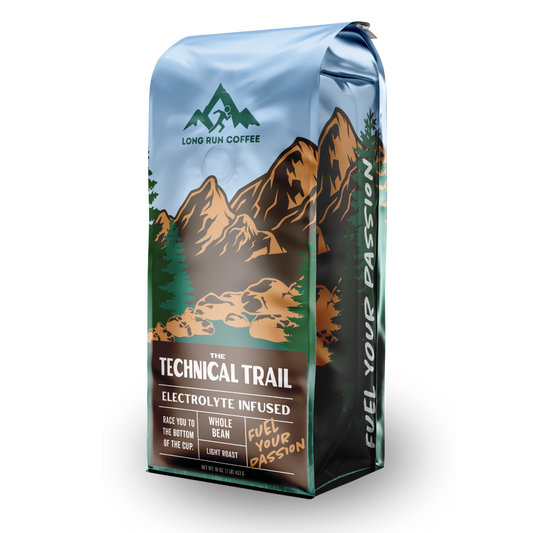
Everything is Training
10 Minute Read (It's worth it)
We’re going to make a bold claim right now….
Runners are better at life.
Okay, okay. That’s a bit dramatic. And egotistical. But runners are actually quite growth-minded and disciplined! And, we have a theory. Everything in life can, and should, be approached the same way you would train for a race.
We runners follow structured plans to prepare for races. We increase our mileage methodically, incorporate speed workouts, recovery runs, & long runs, prioritize rest, and fuel with specific nutrition.
We’re going to make the claim that every training principle from running can be applied to anything in life (hence the phrase “everything is training”).
- Trying to pass an exam? You’re training.
- Trying to get through a big project at work? You’re training.
- Trying to find the love of your life? You’re training.
The metaphor has no limits. The core principles of training for a race apply to life overall, and we runners should apply our understanding of sound training principles to any goal we have.
Consistency
Consistency is the backbone of any successful training regimen.
This is obvious, but why is it the case? The brain and body will adapt to the stimulus we give it. In order to truly improve, though, the brain and body need consistent stimulus. We need to force our biology to say “okay, well if you’re going to do this all the time, I guess we’ll get good at it.”
Just as runners commit to regular workouts to build endurance, the same principle applies to life. Whether it's pursuing a career, studying for an exam, mastering a skill, or maintaining relationships, progress comes from consistent effort over time.
Big goals take time, and that’s not a secret. If you can accomplish your goal with one night of work, your goal isn’t big enough. Everything is training, and life is a marathon.
Progression
When training for a race, we gradually and methodically increase mileage over time. We’re ensuring that the body can actually adapt to the training stimulus we give it. Likewise, in life, we benefit from moving forward and building efforts at a steady increase.
Think about what it would be like to start a new job. We all know people who have tried doing too much, too fast, and too soon. And what happens? They burn out. They “overtrain.” Just as a marathon training plan may increase mileage by 10% each week (for example), advancing in your career requires a similar approach—incremental progress leads to sustainable growth.
Specificity
A good training plan involves a mix of workouts—long runs, speed sessions, hill repeats, recovery runs, etc. This variety enhances overall fitness, but also prepares the body for the specific type of effort required for race day. Can’t run a marathon without the long runs, right? (Well you can, but it wouldn’t go well).
If you're learning a new skill or pursuing personal growth, vary your approach. Create metaphorical long runs and recovery runs in whatever life goal you’re pursuing. Different methods of learning and exposure to stimulus will help the body adapt and become well-rounded. Every good training plan has heavier days, followed by some recovery. It creates balance and adaptability.
Recovery
Recovery is essential in both running and life. Runners understand the importance of rest days and recovery weeks, because this is when the actual adaptations in the body can take place. In life, too, rest and rejuvenation are absolutely required for mental and physical growth.
Consider you’re entering a really busy season at work. You know it’ll have a lot of metaphorical “back to back long runs.” During this time, recovery days will be important. Make sure your weekends are relaxing, and consider scheduling a “recovery week” after the busy season has ended. Rest allows us to go further, but is also where we're strengthened. And now, you’ll not only make it through your busy season, but you’ll be stronger for the next one.
Nutrition & Sleep
These ones are easy.
Nutrition fuels running performance, providing energy and supporting recovery. The things we consume can energize us, make us tired, help us feel light on our feet, or make us feel sluggish. Of course this is not unique to athletes - nutrition will always play a critical role in the functioning of our body & mind. The way we eat can even impact our memory and ability to learn.
Sleep too is imperative. This is when the body rebuilds! And from a general life satisfaction perspective, anxiety disorders, obsessive compulsion, etc. etc. etc. are all made worse by (and are very, very highly correlated with) poor sleep quality and patterns. We need consistent and sufficient sleep in order to recover from our literal and metaphorical training sessions.
Mindset
Running teaches resilience. Executing on a several month-long training plan builds mental endurance, because, what doesn’t kill us makes us stronger.
We like to view mental stress the same way we view physical stress. When you run, you are intentionally putting the body through physical stress so that it can rebuild stronger. If you’re going through a high mental stress period of time, well then guess what? Now you’ll rebuild stronger.
You can continue to tackle higher and higher stress levels that would crush a normal person. This is a powerful mindset, and it’s true. If you believe stress helps you long term, then it does. If you believe it’s harmful, then it will be.
Adaptability
Training plans are not set in stone. The best runners understand that they’ll need to adapt based on how they feel. Similarly, life demands flexibility and adaptability to navigate unexpected challenges and opportunities.
In pursuing any goal, be ready to adjust your approach. Life, like running, is never a linear progression. Adapt to circumstances, learn from setbacks, and stay consistent.
Everything is Training - Training is Everything
Just as we approach running with structure, dedication, and purpose, we can apply the same principles to all areas of life. By recognizing that "everything is training," we can cultivate habits that promote consistency, progression, and resilience in pursuit of literally any goal we have.
Call to Action
We think you can get pretty wild with this metaphor. We kept this high level, but think about any training plan component and see if it has a parallel in life. Even think about things like cross training, base phases, base mileage, peak weeks, back to back long runs, etc. etc. etc. Consider their purpose in a training plan, then apply it to life. Have fun with it!











